Key takeaways:
- Anti-corruption laws serve as vital safeguards for integrity in business and governance, highlighting the importance of transparency and cultural nuances in understanding corruption.
- Robust anti-corruption measures foster public trust, economic stability, and accountability, empowering employees and protecting whistleblowers.
- Challenges in enforcement include fear of retaliation, lack of political will, and resource constraints, necessitating effective strategies like internal controls, compliance training, and a culture of openness.
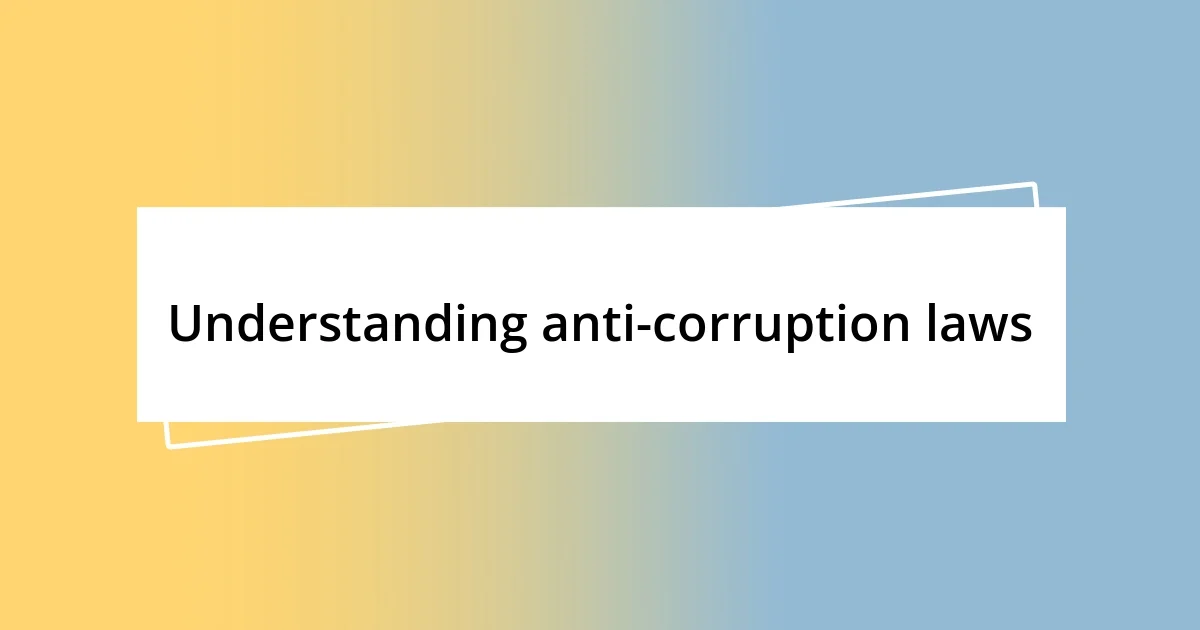
Understanding anti-corruption laws
Understanding anti-corruption laws requires more than just a basic overview; it’s about grasping the moral and ethical implications that these laws embody. I remember the first time I truly understood this during a workshop on corporate ethics. It hit me that these laws weren’t just bureaucratic forays but rather vital safeguards for integrity within business operations and governance.
It’s interesting to consider how anti-corruption laws differ across countries. For instance, in some places, a single act of bribery might seem benign, while in others, it can lead to severe consequences for individuals and organizations. Do you think this inconsistency affects how we view corruption on a global scale? Personally, it made me think about the cultural nuances surrounding ethics and legality.
Moreover, what resonates with me is the role of transparency in fostering a culture against corruption. I once worked on a project where we had to navigate complex regulations, and I realized that clear communication and openness about our processes fostered trust. This experience taught me that when people understand the laws, they become advocates for integrity rather than merely comply with expectations.
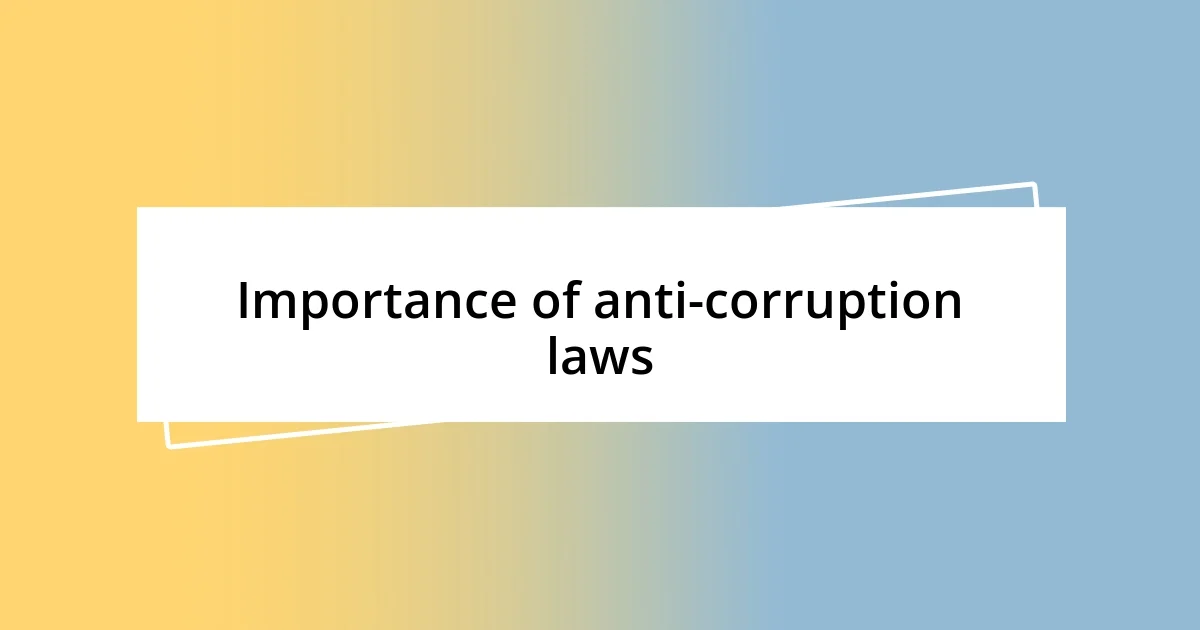
Importance of anti-corruption laws
The importance of anti-corruption laws cannot be overstated, as they play a crucial role in maintaining trust and integrity within society. Reflecting on my experiences in various organizations, I observed that robust anti-corruption measures not only protect businesses but also empower employees to act ethically without fear of retaliation. I remember a time when a colleague reported suspicious activities in our department, and because of the laws in place, the matter was taken seriously rather than brushed aside. This act of courage became a turning point, fostering a culture of accountability that benefited everyone involved.
Consider the following key benefits of anti-corruption laws:
- Trust Building: They enhance public trust in institutions and governance, which is essential for a healthy society.
- Economic Stability: By reducing corruption, these laws create a more stable environment for investments and economic growth.
- Social Equality: They help level the playing field, ensuring that opportunities aren’t limited to those willing to engage in unethical practices.
- Enhanced Accountability: With clear regulations, individuals and organizations are held accountable for their actions, promoting a sense of responsibility.
- Protecting Whistleblowers: Strong anti-corruption legislation can safeguard those who report wrongdoing, encouraging more people to come forward without fear.
Reflecting on these aspects, I feel a sense of hope knowing that these laws can lead to profound positive change in our communities. Each point encapsulates why standing firm against corruption is vital for our collective future.
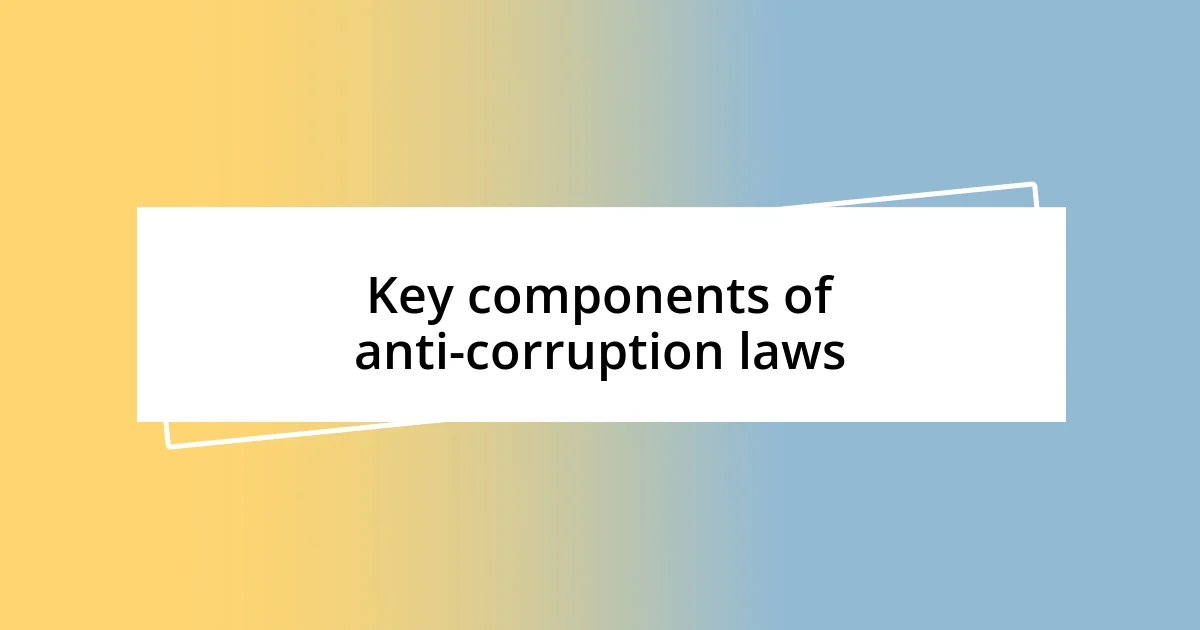
Key components of anti-corruption laws
Anti-corruption laws typically encompass several key components that are vital for their effectiveness. One fundamental element is the establishment of clear definitions of corrupt activities, such as bribery and embezzlement. In my own experience, I once encountered a situation where the lack of precise definitions in a policy led to confusion among employees about what constituted unethical behavior. It highlighted for me how essential it is for organizations to articulate these definitions, ensuring everyone understands unacceptable practices.
Another important aspect is the enforcement mechanisms that support these laws. The presence of dedicated agencies and resources to investigate corruption is crucial. I recall attending a seminar where a former investigator shared a story about how a small, but well-equipped anti-corruption task force managed to expose an extensive bribery scheme. This not only reinforced my belief in the importance of having these enforcement bodies but also made me appreciate the courage of those individuals who stand up against corruption despite the risks involved.
Training and awareness initiatives are additional key components that cannot be overlooked. I once participated in a compliance training session that truly opened my eyes to the nuances of anti-corruption laws. It was transformative to realize how educating employees can create a proactive environment where integrity is not just encouraged but ingrained in the corporate culture. This empowerment fundamentally changes the dynamics within an organization, promoting a vigilant stance against corruption.
| Key Components | Importance |
|---|---|
| Clear Definitions | Ensures everyone understands what constitutes corruption |
| Enforcement Mechanisms | Supports investigations and accountability |
| Training Initiatives | Fosters an ethical culture through education |
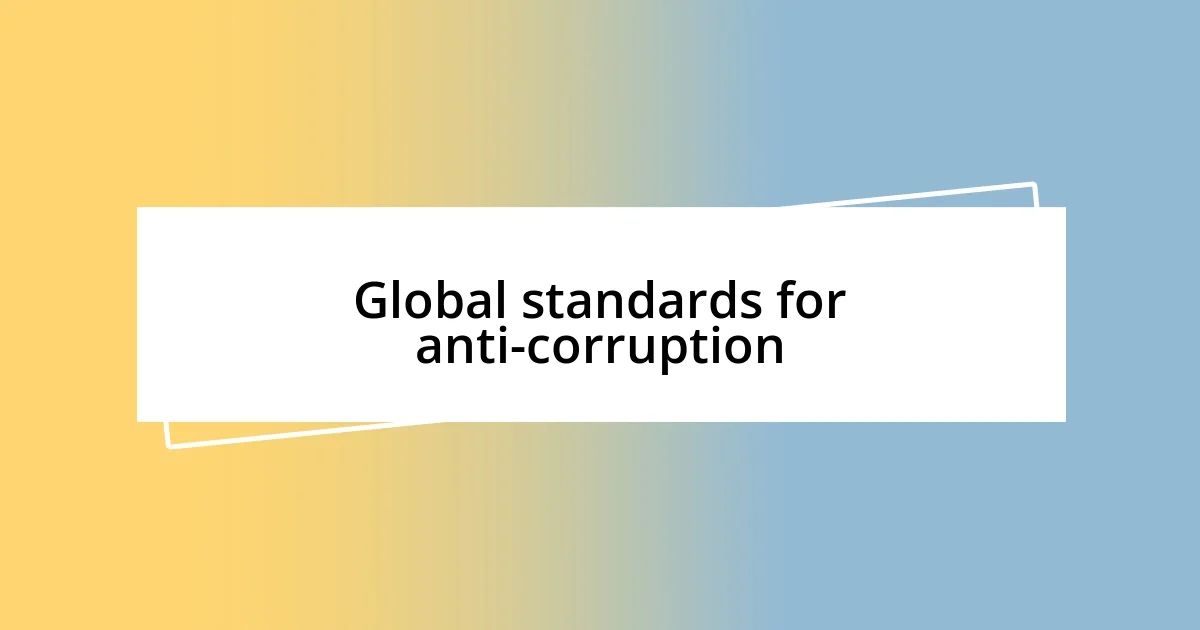
Global standards for anti-corruption
Global anti-corruption standards are crucial in guiding nations towards more transparent and accountable governance. For instance, conventions such as the OECD Anti-Bribery Convention set the bar for member countries by mandating the criminalization of bribery of foreign public officials. I remember when I first learned about these global frameworks; it struck me how interconnected our lives are. What happens in one country can ripple across the world, affecting us all.
The World Bank also emphasizes the need for standardized practices to combat corruption effectively. They provide resources and frameworks for countries eager to reduce corrupt practices and forge a path toward development. I had the opportunity to participate in a workshop focused on these frameworks, and I vividly recall the powerful stories shared by representatives from various countries who had successfully transformed their governance structures. It was inspiring to see how a commitment to universal standards could spur real change.
Moreover, the Global Integrity Index serves as a tangible measure of a country’s progress in anti-corruption efforts. As I delved deeper into this index during my studies, I found myself questioning how my own country measured up. Reflecting on my experiences, I realized that each benchmark established by these standards not only guides governments but also empowers citizens to hold authorities accountable. Can you imagine the positive shift in public perception when corruption is systematically addressed? It truly reinforces the idea that we all have a role to play in demanding integrity and transparency from our leaders.
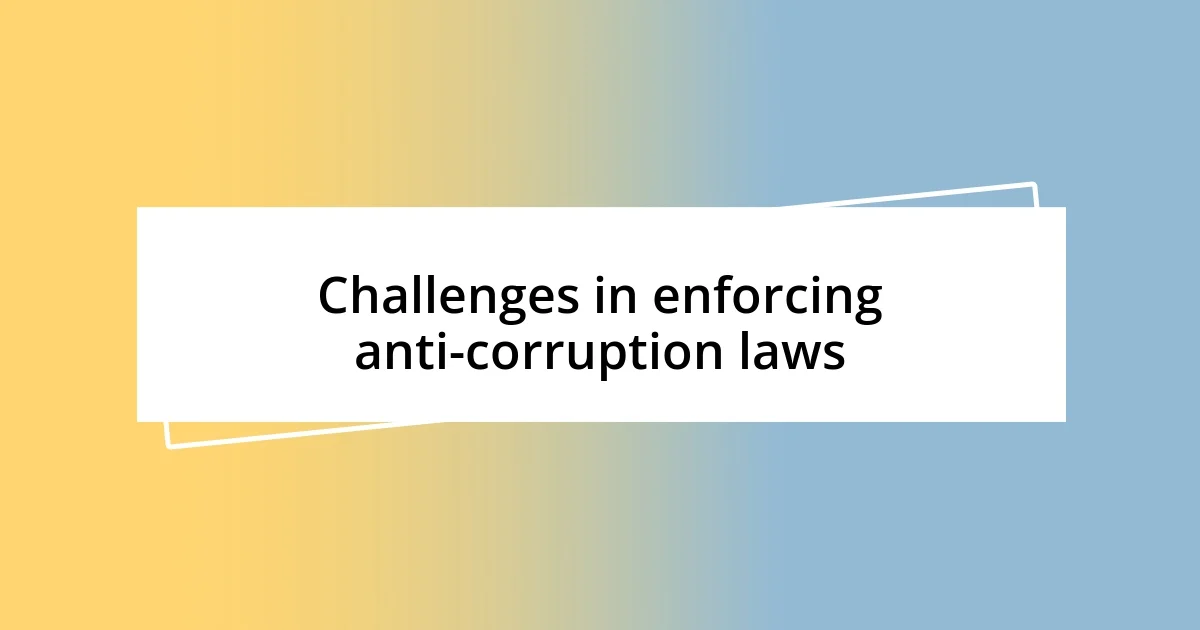
Challenges in enforcing anti-corruption laws
Enforcing anti-corruption laws often faces formidable challenges, primarily due to the ingrained nature of corruption within certain systems. I recall reading a case study about a country where whistleblowers faced severe repercussions for speaking out. It made me ponder: how can we expect individuals to step forward when they risk losing everything? The fear of retaliation creates a chilling effect that stifles accountability and transparency.
Another significant hurdle is the lack of political will to tackle corruption. In my experience, I’ve seen how leaders may pay lip service to anti-corruption efforts while simultaneously engaging in corrupt practices themselves. This hypocrisy raises a pressing question: what good are laws on the books if they’re not being enforced by those who make them? It’s disheartening to realize that without genuine commitment from leadership, anti-corruption laws can easily become empty promises.
Furthermore, resource constraints can severely limit the effectiveness of enforcement agencies. During my involvement in a local project aimed at improving governance, I discovered that investigators often lacked the necessary tools and training to pursue complex corruption cases. It struck me how essential it is to invest in these pivotal resources. Without adequate support, how can we expect these laws to translate into real action? The reality is, without the right infrastructure and investment, our fight against corruption can often feel like an uphill battle.
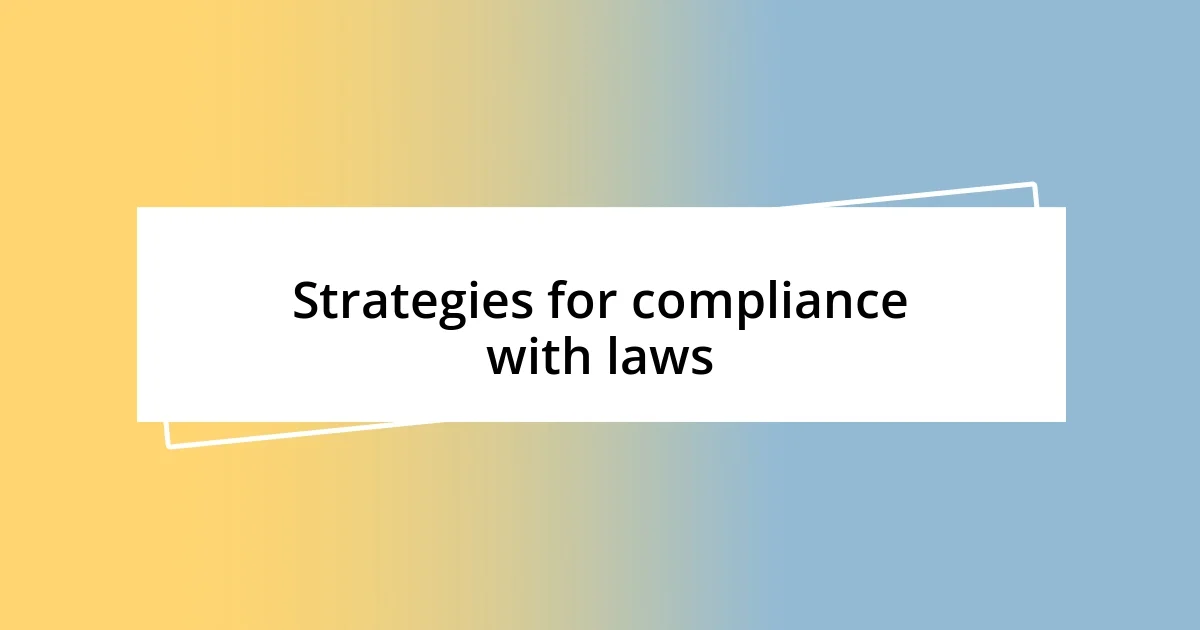
Strategies for compliance with laws
One effective strategy for compliance with anti-corruption laws is the implementation of robust internal controls. During my time working with an organization that prioritized transparency, I saw firsthand how establishing clear policies and procedures helped deter corrupt practices. I can’t emphasize enough how solid internal frameworks create an environment of accountability—when everyone knows the protocols, there’s less room for misconduct.
Training employees on compliance is another essential strategy. I once attended a workshop where experts illustrated the real-world impacts of corrupt practices. The stories shared left a lasting impression on attendees, including myself. It became clear that when organizations invest in educating their staff, they not only increase awareness but also cultivate a culture of integrity. Have you ever seen how a well-informed team can proactively manage risks? It’s truly inspiring.
Lastly, fostering a culture of openness and whistleblower protection can make a significant difference. I recall working on an initiative that encouraged reporting unethical behavior, and I was amazed at how many individuals stepped forward once they felt secure. Creating channels for open communication empowers employees while demonstrating that their voices matter. Isn’t it fascinating how a simple assurance can lead to monumental changes in an organization’s ethical landscape?














